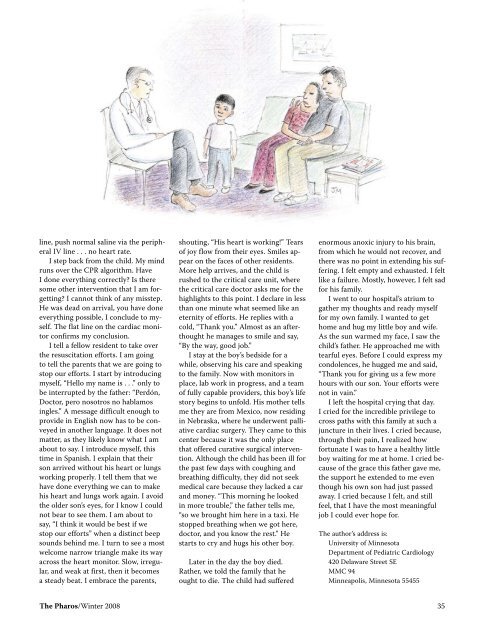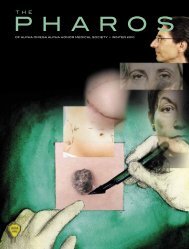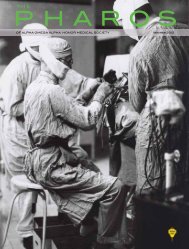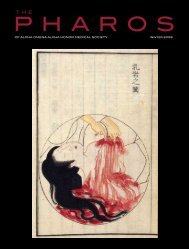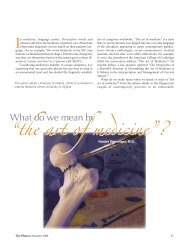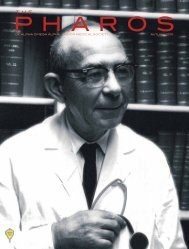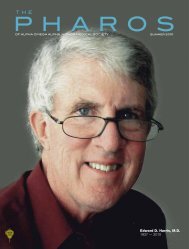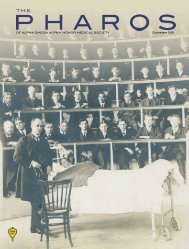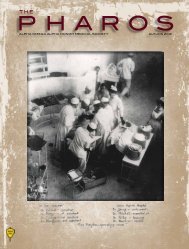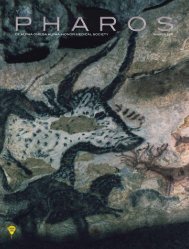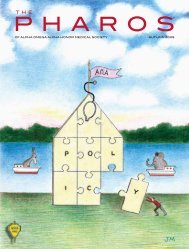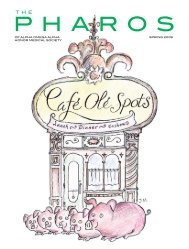Download The Pharos Winter 2008 Edition - Alpha Omega Alpha
Download The Pharos Winter 2008 Edition - Alpha Omega Alpha
Download The Pharos Winter 2008 Edition - Alpha Omega Alpha
You also want an ePaper? Increase the reach of your titles
YUMPU automatically turns print PDFs into web optimized ePapers that Google loves.
line, push normal saline via the peripheral<br />
IV line . . . no heart rate.<br />
I step back from the child. My mind<br />
runs over the CPR algorithm. Have<br />
I done everything correctly? Is there<br />
some other intervention that I am forgetting?<br />
I cannot think of any misstep.<br />
He was dead on arrival, you have done<br />
everything possible, I conclude to myself.<br />
<strong>The</strong> flat line on the cardiac monitor<br />
confirms my conclusion.<br />
I tell a fellow resident to take over<br />
the resuscitation efforts. I am going<br />
to tell the parents that we are going to<br />
stop our efforts. I start by introducing<br />
myself, “Hello my name is . . .” only to<br />
be interrupted by the father: “Perdón,<br />
Doctor, pero nosotros no hablamos<br />
ingles.” A message difficult enough to<br />
provide in English now has to be conveyed<br />
in another language. It does not<br />
matter, as they likely know what I am<br />
about to say. I introduce myself, this<br />
time in Spanish. I explain that their<br />
son arrived without his heart or lungs<br />
working properly. I tell them that we<br />
have done everything we can to make<br />
his heart and lungs work again. I avoid<br />
the older son’s eyes, for I know I could<br />
not bear to see them. I am about to<br />
say, “I think it would be best if we<br />
stop our efforts” when a distinct beep<br />
sounds behind me. I turn to see a most<br />
welcome narrow triangle make its way<br />
across the heart monitor. Slow, irregular,<br />
and weak at first, then it becomes<br />
a steady beat. I embrace the parents,<br />
sh0uting, “His heart is working!” Tears<br />
of joy flow from their eyes. Smiles appear<br />
on the faces of other residents.<br />
More help arrives, and the child is<br />
rushed to the critical care unit, where<br />
the critical care doctor asks me for the<br />
highlights to this point. I declare in less<br />
than one minute what seemed like an<br />
eternity of efforts. He replies with a<br />
cold, “Thank you.” Almost as an afterthought<br />
he manages to smile and say,<br />
“By the way, good job.”<br />
I stay at the boy’s bedside for a<br />
while, observing his care and speaking<br />
to the family. Now with monitors in<br />
place, lab work in progress, and a team<br />
of fully capable providers, this boy’s life<br />
story begins to unfold. His mother tells<br />
me they are from Mexico, now residing<br />
in Nebraska, where he underwent palliative<br />
cardiac surgery. <strong>The</strong>y came to this<br />
center because it was the only place<br />
that offered curative surgical intervention.<br />
Although the child has been ill for<br />
the past few days with coughing and<br />
breathing difficulty, they did not seek<br />
medical care because they lacked a car<br />
and money. “This morning he looked<br />
in more trouble,” the father tells me,<br />
“so we brought him here in a taxi. He<br />
stopped breathing when we got here,<br />
doctor, and you know the rest.” He<br />
starts to cry and hugs his other boy.<br />
Later in the day the boy died.<br />
Rather, we told the family that he<br />
ought to die. <strong>The</strong> child had suffered<br />
enormous anoxic injury to his brain,<br />
from which he would not recover, and<br />
there was no point in extending his suffering.<br />
I felt empty and exhausted. I felt<br />
like a failure. Mostly, however, I felt sad<br />
for his family.<br />
I went to our hospital’s atrium to<br />
gather my thoughts and ready myself<br />
for my own family. I wanted to get<br />
home and hug my little boy and wife.<br />
As the sun warmed my face, I saw the<br />
child’s father. He approached me with<br />
tearful eyes. Before I could express my<br />
condolences, he hugged me and said,<br />
“Thank you for giving us a few more<br />
hours with our son. Your efforts were<br />
not in vain.”<br />
I left the hospital crying that day.<br />
I cried for the incredible privilege to<br />
cross paths with this family at such a<br />
juncture in their lives. I cried because,<br />
through their pain, I realized how<br />
fortunate I was to have a healthy little<br />
boy waiting for me at home. I cried because<br />
of the grace this father gave me,<br />
the support he extended to me even<br />
though his own son had just passed<br />
away. I cried because I felt, and still<br />
feel, that I have the most meaningful<br />
job I could ever hope for.<br />
<strong>The</strong> author’s address is:<br />
University of Minnesota<br />
Department of Pediatric Cardiology<br />
420 Delaware Street SE<br />
MMC 94<br />
Minneapolis, Minnesota 55455<br />
<strong>The</strong> <strong>Pharos</strong>/<strong>Winter</strong> <strong>2008</strong> 35


